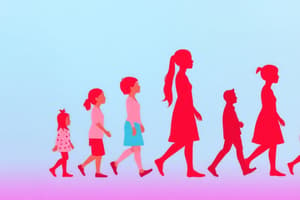Podcast
Questions and Answers
What defines race in humans?
What defines race in humans?
- Outward physical characteristics or social qualities (correct)
- Genetic similarities among individuals
- Biological differences between groups
- Differences in economic status
Which of the following statements about culture is true?
Which of the following statements about culture is true?
- Culture is solely defined by language.
- Culture is constantly changing through contact with other cultures. (correct)
- Culture is a fixed concept that does not change.
- Culture prioritizes individual goals above all else.
In an individualistic culture, individuals are likely to:
In an individualistic culture, individuals are likely to:
- Focus on community welfare above personal success.
- Consider themselves distinct from others. (correct)
- Base their identity solely on family relationships.
- Prioritize collective goals over personal aspirations.
What is a characteristic of collectivistic culture?
What is a characteristic of collectivistic culture?
The combination of economic and social factors that describe an individual or family includes all except:
The combination of economic and social factors that describe an individual or family includes all except:
What does physical development primarily encompass?
What does physical development primarily encompass?
Which age range corresponds to early childhood?
Which age range corresponds to early childhood?
When do children typically say their first word?
When do children typically say their first word?
What aspect of development focuses on learning, memory, and creativity?
What aspect of development focuses on learning, memory, and creativity?
Which period of the life span covers ages 40 to 65?
Which period of the life span covers ages 40 to 65?
What do developmentalists study aside from universal processes of development?
What do developmentalists study aside from universal processes of development?
At what ages does adolescence typically occur?
At what ages does adolescence typically occur?
What defines the periods of the life span according to current understanding?
What defines the periods of the life span according to current understanding?
What defines a non-normative influence?
What defines a non-normative influence?
What is meant by the term 'critical period'?
What is meant by the term 'critical period'?
Which of the following is NOT an example of non-normative influence?
Which of the following is NOT an example of non-normative influence?
Who demonstrated the concept of imprinting in newly hatched goslings?
Who demonstrated the concept of imprinting in newly hatched goslings?
What distinguishes a sensitive period from a critical period in development?
What distinguishes a sensitive period from a critical period in development?
Which statement about development is true based on the given concepts?
Which statement about development is true based on the given concepts?
What is an example of a sensitive period in human development?
What is an example of a sensitive period in human development?
What does the concept of multidirectionality in development imply?
What does the concept of multidirectionality in development imply?
What describes a typical event that happens at an unusual time of life?
What describes a typical event that happens at an unusual time of life?
Which of the following best describes the term 'socioeconomic status'?
Which of the following best describes the term 'socioeconomic status'?
Which domain of development focuses on mental processes and capabilities?
Which domain of development focuses on mental processes and capabilities?
Which factor is strongly correlated with chronological age?
Which factor is strongly correlated with chronological age?
What term describes a group that encompasses a society's total way of life, including learned behaviors?
What term describes a group that encompasses a society's total way of life, including learned behaviors?
Which concept refers to the idea that development can be influenced by both inherited traits and environmental factors?
Which concept refers to the idea that development can be influenced by both inherited traits and environmental factors?
What does stability in development primarily result from?
What does stability in development primarily result from?
What is the focus of contemporary theorists regarding the nature vs. nurture debate?
What is the focus of contemporary theorists regarding the nature vs. nurture debate?
In the context of development, what does change signify?
In the context of development, what does change signify?
Which of the following best defines plasticity in development?
Which of the following best defines plasticity in development?
What does the concept of continuity refer to in the context of development?
What does the concept of continuity refer to in the context of development?
Which factor is emphasized by developmentalists who argue for stability?
Which factor is emphasized by developmentalists who argue for stability?
What is the primary focus of the field of human development according to the content?
What is the primary focus of the field of human development according to the content?
Flashcards are hidden until you start studying
Study Notes
Basic Concepts in Human Development
- Domains of Development: Physical, Cognitive, and Psychosocial development are separate but interconnected.
- Physical Development: Growth of the body and brain, sensory capacities, motor skills, and health.
- Cognitive Development: Learning, attention, memory, language, thinking, reasoning, and creativity.
- Psychosocial Development: Changes in emotions, personality, and social relationships
Periods of the Life Span
- Prenatal Period: Conception to birth.
- Infancy: Birth to age 3.
- Early Childhood: Ages 3 to 6
- Middle Childhood: Ages 6 to 11.
- Adolescence: Ages 11 to 20.
- Emerging Adulthood: Ages 20 to 40
- Middle Adulthood: 40 to 65
- Late Adulthood: 65 and over
Influences on Development
- Socioeconomic Status (SES): Combination of economic and social factors describing an individual or family, including income, education, and occupation.
- Culture: A society's or group's total way of life, including customs, traditions, beliefs, values, language, and physical products - all learned behavior passed down from parents to children.
- Cultural Influences: Individualistic and Collectivistic cultures
Race and Ethnicity
- Race: A grouping of humans distinguished by their outward physical characteristics or social qualities from other groups. Not a biological construct.
- Ethnicity: Individuals grouped by shared cultural heritage, language, shared history, ancestry, etc.
Normative and Non-Normative Influences
- Normative Age-Graded Influences: Typical events that happen at an expected time or age and are common to most within a group.
- Normative History-Graded Influences: Common events that happen to people at an unusual time, or an event that happens at a specific time that affects all individuals in a cohort.
- Non-Normative Influences: Characteristic of an unusual event that happens to a particular person or a typical event that happens at an unusual time of life. Unique experiences.
Timing of Influence
- Imprinting: A process that occurs during a critical period where an organism's nervous system is ready to acquire information.
- Critical Period: Specific time when a given event, or its absence, has a specific impact on development.
- Sensitive Period: The time when a developing person is especially responsive to certain types of experiences. Sensitive periods do not have a definitive ending point or are as strong in effect as critical periods.
Life-Span Developmental Approach
- Development is Lifelong: Development continues throughout the lifespan.
- Development is Multidimensional: It involves changing, interacting, and interconnected areas of development.
- Development is Multidirectional: Development can involve gains and losses at all ages.
- Development is Plastic: Development can be changed and modified.
- Relative Influences of Biology and Culture: Genetics and environment play a role in influencing development.
- Development is Influenced by the Historical and Cultural Context: Cultures shift, leading to changes in developmental processes.
Developmental Issues
- Nature vs. Nurture: The debate over whether development is influenced more by genetics or environment.
- Stability vs. Change: The debate over whether development involves stability or change, and to what degree.
Key People
- Konrad Lorenz: Zoologist who studied the "impressing" process.
Studying That Suits You
Use AI to generate personalized quizzes and flashcards to suit your learning preferences.




